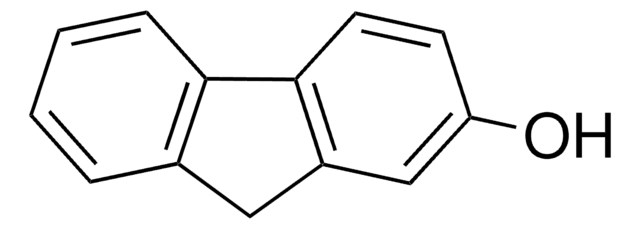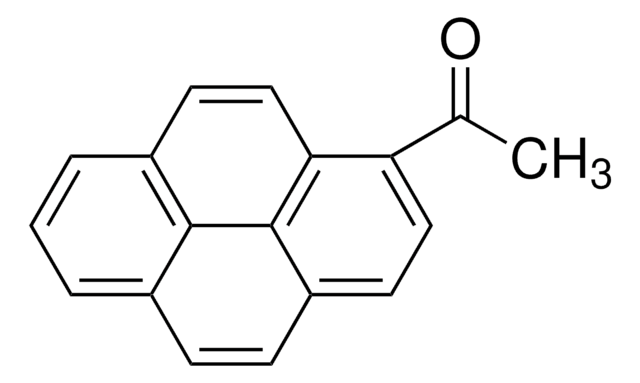All Photos(1)
About This Item
Empirical Formula (Hill Notation):
C16H10O
CAS Number:
Molecular Weight:
218.25
MDL number:
UNSPSC Code:
12352100
PubChem Substance ID:
NACRES:
NA.22
Assay:
98%
Recommended Products
Quality Level
Assay
98%
mp
179-182 °C (lit.)
SMILES string
Oc1ccc2ccc3cccc4ccc1c2c34
InChI
1S/C16H10O/c17-14-9-7-12-5-4-10-2-1-3-11-6-8-13(14)16(12)15(10)11/h1-9,17H
InChI key
BIJNHUAPTJVVNQ-UHFFFAOYSA-N
Looking for similar products? Visit Product Comparison Guide
General description
1-Hydroxypyrene, as a urinary metabolite, is a marker of polycyclic aromatic hydrocarbons (PAH) exposure. 1-Hydroxypyrene is an important biomarker of exposure to pyrene.
Application
1-Hydroxypyrene is suitable for use in following studies:
- To investigate the fast detection and quantification of 1-hydroxypyrene in tissue extracts from Nereis diversicolor exposed to sediment-associated pyrene by a simple fluorometric method.
- To investigate the effects of genetic polymorphisms of the cytochrome P450 1A1 (CYP1A1) and 2E1 (CYP2E1) and glutathione S-transferases mu (GSTM1) and theta (GSTT1) on urinary 1-hydroxypyrene and 2-naphthol levels in aircraft maintenance workers.
- To examine the the PAH exposure of cokery workers in an Estonian oil shale processing plant.
Storage Class Code
11 - Combustible Solids
WGK
WGK 3
Flash Point(F)
Not applicable
Flash Point(C)
Not applicable
Personal Protective Equipment
dust mask type N95 (US), Eyeshields, Gloves
Choose from one of the most recent versions:
Already Own This Product?
Find documentation for the products that you have recently purchased in the Document Library.
Customers Also Viewed
Zheng Li et al.
Chemical research in toxicology, 25(7), 1452-1461 (2012-06-06)
Human exposure to polycyclic aromatic hydrocarbons (PAHs) can be assessed by biomonitoring of their urinary monohydroxylated metabolites (OH-PAHs). Limited information exists on the human pharmacokinetics of OH-PAHs. This study aimed to investigate the excretion half-life of 1-hydroxypyrene (1-PYR), the most
T Kuljukka et al.
Environmental health perspectives, 104 Suppl 3, 539-541 (1996-05-01)
The exposure of Estonian cokery workers to polynuclear aromatic hydrocarbons at an oil shale processing plant was assessed by occupational hygiene and biomonitoring measurements. To assess the external dose of exposure to polynuclear aromatic hydrocarbons, pyrene and benzo[a]pyrene concentrations were
P Strickland et al.
Toxicology letters, 108(2-3), 191-199 (1999-10-08)
Humans are exposed to polycyclic aromatic hydrocarbons (PAHs) from occupational, environmental, medicinal and dietary sources. PAH metabolites in human urine can be used as biomarkers of internal dose to assess recent exposure to PAHs. The most widely used urinary PAH
Jena Webb et al.
International archives of occupational and environmental health, 91(1), 105-115 (2017-09-25)
Polycyclic aromatic hydrocarbons (PAHs) are contaminants with carcinogenic effects but little is known about their presence in environments surrounding oil drilling operations and spills or exposure levels in nearby communities. The objective of this study was to characterize PAH levels
Anders M B Giessing et al.
Marine environmental research, 56(5), 599-615 (2003-08-21)
The uptake of polycyclic aromatic hydrocarbons (PAHs) by marine deposit-feeding invertebrates can be determined by screening for PAH-derived metabolites. We identified 1-hydroxypyrene as the only intermediate metabolite in tissue of four species of deposit-feeding polychaetes, Nereis diversicolor, Nereis virens, Arenicola
Our team of scientists has experience in all areas of research including Life Science, Material Science, Chemical Synthesis, Chromatography, Analytical and many others.
Contact Technical Service















